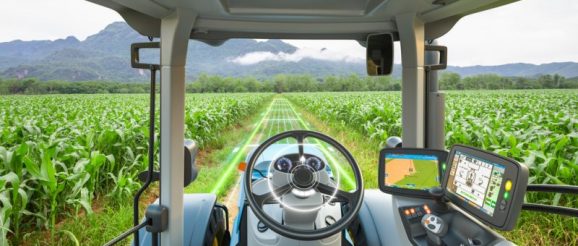Next generation farming powered with AI product innovation

By Fiona Alston | Euractiv’s Advocacy Lab Est. 5min 24-04-2024 Content-Type: Underwritten Underwritten Produced with financial support from an organization or individual, yet not approved by the underwriter before or after publication. 5G autonomous tractor working in corn field, Future technology with smart agriculture farming concept. [Shutterstock / Suwin66] Euractiv is part of the Trust Project >>> Print Email Facebook Twitter LinkedIn WhatsApp Telegram Europe’s agri sector is in the middle of a shakedown. Caught between a rock and a hard place, farmers are taking heat for the climate crisis, trying to keep their heads above flood water, deal with extreme weather events, and keep pace with changes in consumer demand. A wealth of new knowledge, innovation and methods are being applied to farming, but this already difficult vocation is bearing witness to an exodus from the farming community, either through farmers leaving the industry, or retiring without a new generation to take over the family business. The need for impactful environmental changes to slow the climate crisis has hit farmers hard. They have fed and clothed the world’s population for centuries, weathering harsh conditions and doing an often thankless job, suddenly they are the target of a multitude of green campaigns. Climate medicine is increasingly hard to swallow. The pills that could not be swallowed have brought farmers from their fields to the streets. Capitals have seen protests against ongoing changes imposed on the agri sector, and the lack of support for farmers over food prices, fuel prices and imports, amongst other issues. For many climate advocates, the narrative that ‘agriculture contributes more than 10% of the EU’s total greenhouse gas (GHG) emissions’ is a hard reality to ignore. When we speak about next-generation farming, yes, it’s full of technical upgrades and innovations but we are getting ready to miss out on the next generation of farmers and loss of legacy farming. Innovation start-ups With a smorgasbord of technological sectors to choose from, innovation in the farming sector is never far from any tech hub. From the use of satellites in space tech, and drone technology in the mobility sector to soil monitoring solutions, from the deep tech sector and of course, the willingness to adapt to AI, the agrifood and tech sector is ripe with opportunity and advancement. The introduction of AI and robotic solutions is serving up some excellent solutions to manage staff shortages in seasonal farming. Robotic solutions provide a 24-hour solution to farmers, particularly during the fickle crop-picking season. The majority of the member states have incubator and accelerator programmes for agri or sustainability start-ups, and when it comes to funding outside of these programmes, despite the caution being shown in the venture capital in the post-Covid boom era, there seems to be plenty of backers looking to scale their next big investment. Future of farming Science-based agritech company Syngenta is working with AI and deep tech firm Insilico Medicine, exploring AI market opportunities, spurred by the example of advancing medical pharmaceutical research. They see that the pharmaceutical innovation principles that are delivering a generational shift in human medicines, could be applied to finding alternative soil solutions – which could, in turn, deliver a smoother transition for farmers. A study by the European Commission assessed options for mitigating climate change in agriculture by putting a price on emissions and rewarding carbon farming. Agritech start-ups like eAgronom incentivise and advise farmers to reduce their CO2 emissions through its carbon credit scheme, the credits can then be sold to corporates to ease their guilt or offset their emissions. The unique thing about agricultural sector emission is they are emitted while looking after the very thing that can offset those emissions. Carbon farming is a way forward to help meet the net zero targets promised by 2050. Through tree planting, hedgerow maintenance (or rather un-maintenance), crops and better soil management farmers can turn their environmental hazards into carbon succulence. The sector is learning how carbon farming can be incentivised through many carbon credit schemes. Election pivots The sight of farmers aggressively protesting en-masse led Ursula von der Leyen to pin her colours warily to the farmers’ fence post, declaring her European People’s Party (EPP) is the party of the farmers. Farmers could benefit in the June EU elections, validating their questionable tyre-burning excursions to Brussels. The frustration of farmers has given steady rise to support for far-right parties and their often-radical abandonment of climate issues. That includes farmers’ parties including the Farmers Defence Force or ‘freedom parties’ like Party for Freedom PVV which has support from the Farmer–Citizen Movement (BBB) party. Meanwhile, the Greens, Socialists and Democrats and left-wing groups are this week battling a proposal by the Commission to relax some of the environmental requirements in the Common Agricultural Policy (CAP). Whatever the outcome of Europe’s June elections has on future policy changes in agriculture, two points of certainty will remain – there will always be innovation, and dialogue will remain necessary between all parties involved in the farming, environmental, consumer and animal rights sectors. Agri’s future isn’t exactly a field of dreams, but it is well-seeded with innovation which is likely to bloom in season. [By Fiona Alston I Edited by Brian Maguire | Euractiv’s Advocacy Lab ] Read more with Euractiv Parliament gives final nod to loosen green requirements for farmersThe European Parliament gave its final green light on Wednesday (24 April) to changes to some environmental conditions for receiving payments under the bloc’s subsidy scheme, which are expected to come into force by June, after member states’ approval. Print Email Facebook Twitter LinkedIn WhatsApp Telegram Topics agricultue agricultural innovation Agrifood green transition Modern farming promoted
